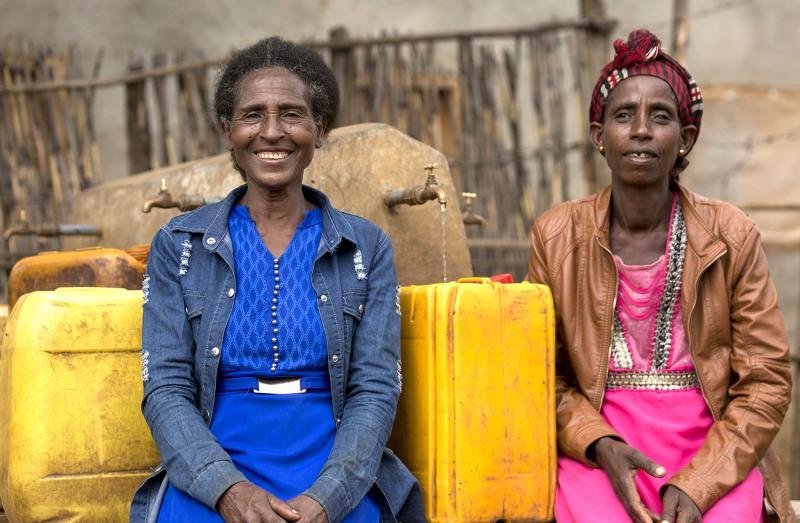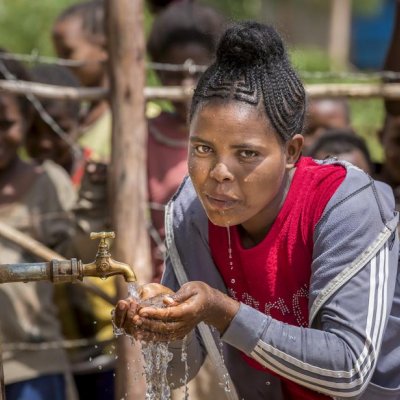COVID-19 Recovery Through Climate-Resilient Water and Sanitation in Africa [NDF C128]

The programme will combat COVID-19 and strengthen the recovery through investments in water supply, sanitation, and water resources management activities in the Sahel and the Horn of Africa. The programme delivery will use a build-back-better and green, climate-resilient approach to target particularly poor, vulnerable and unserved urban communities displaced from the countryside by insecurity, famine and climate/environmental disasters.
REGION
Africa
PROJECT REFERENCE
NDF C128
DURATION
2021 to 2024
NDF FINANCING
EUR 7.5 million
FINANCING TYPE
Grant
IMPLEMENTING AGENCY
African Development Bank
NDF CONTACT
Karin Lindblad (karin.lindblad@ndf.int)
Objective:
The 3-year programme is a response to the COVID-19 pandemic in Africa. The programme will strengthen the recovery through building-back-better and greener investments in water, sanitation, and water resources management activities in the Sahel and the Horn of Africa. The programme builds on the partnership between the African Development Bank (AfDB) / African Water Facility (AWF), the Nordic Development Fund (NDF) and other donors to prevent further transmission of COVID-19 and support five low income and fragile countries in a climate resilient recovery.
The world is under a major health and economic crisis stemming from the spread of the COVID-19 disease. The WHO declared COVID-19 a global pandemic in March 2020 and six months later, the African continent has 1.6 million confirmed cases and almost 40,000 deaths from COVID-19.1 African cities are the epicentres of the pandemic with the majority of the urban population live in slums and informal settlements with limited access to clean water and sanitation.
Regular handwashing with soap and water is a critical first line of the defence against the coronavirus. However, hundreds of millions of Africans have no access to safe water and sanitation, and no access to handwashing facilities. The programme will target five countries: Burkina Faso, Ethiopia, Mali, Niger and Somalia. In these countries, the average rate of access to safely managed drinking water facilities is 53.8%; average rate of access to safely managed sanitation facilities is 23.4%; and average proportion of population with handwashing facilities at home is 22.4%. This situation constrains the use of water and sanitation as a measure to contain the spread of COVID-19 and other water-related infectious diseases.
The programme uses a build-back-better and green, climate-resilient approach to prepare investments in water supply, sanitation, and integrated water resources management. The programme gives priority to urban areas and specifically focuses on urban poor communities, particularly poor, vulnerable and unserved communities displaced from the countryside by insecurity, famine and climate/environmental disasters.
The programme consists of three components:
1) COVID-19 recovery - interventions under this component include the climate-resilient rehabilitation/expansion of existing water supply systems, provision of public sanitation and handwashing facilities, and awareness- raising and public education on sanitation, health and hygiene;
(2) capacity and climate-resilient investment planning, which will support the preparation of investment-ready projects for efficient water supply, sanitation, and integrated water resources management with focus on restoring degraded water catchments;
(3) technical assistance for institutional capacity building for integrated climate water resilience at the city and utility level in the five target countries. Part of the NDF grant will be used to finance a two-year technical assistance consultancy to work at the African Water Facility and provide guidance on integrated water resources management, build-back-better and greener, climate-resilient approaches.
Financing
The total project cost estimate for the COVID-19 recovery programme is EUR 29.2 million with NDF contributing EUR 7.5 million as grant, Denmark providing a grant of EUR 20.1 million, the AfDB/AWF providing a grant of EUR 1.0 million; and beneficiary governments making in-kind contributions of EUR 0.6 million.

